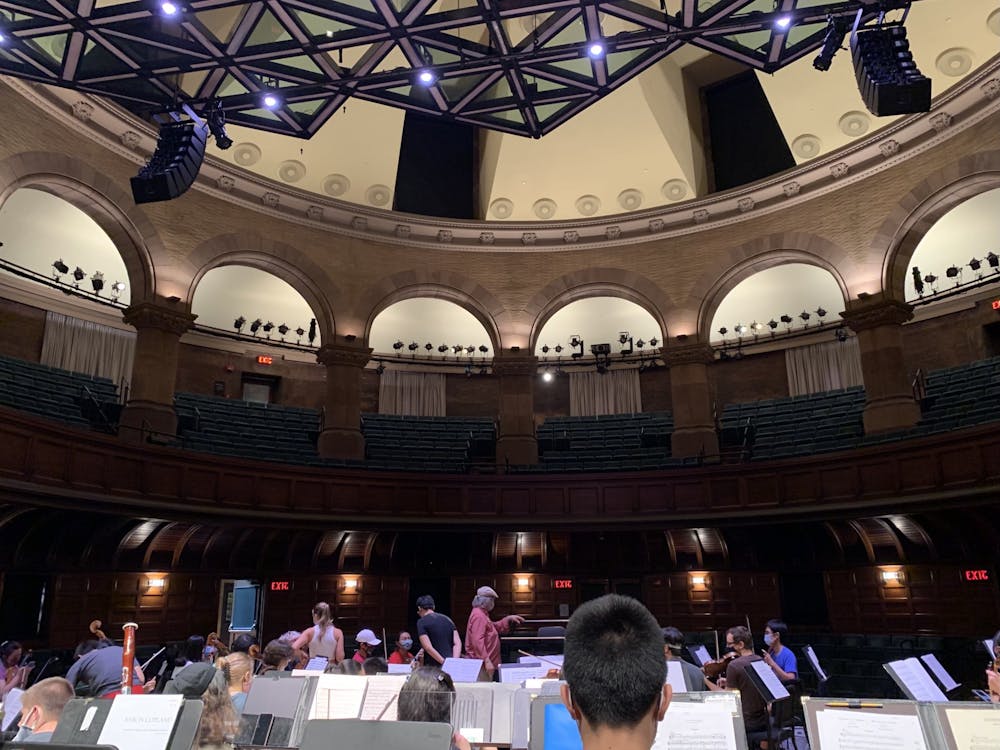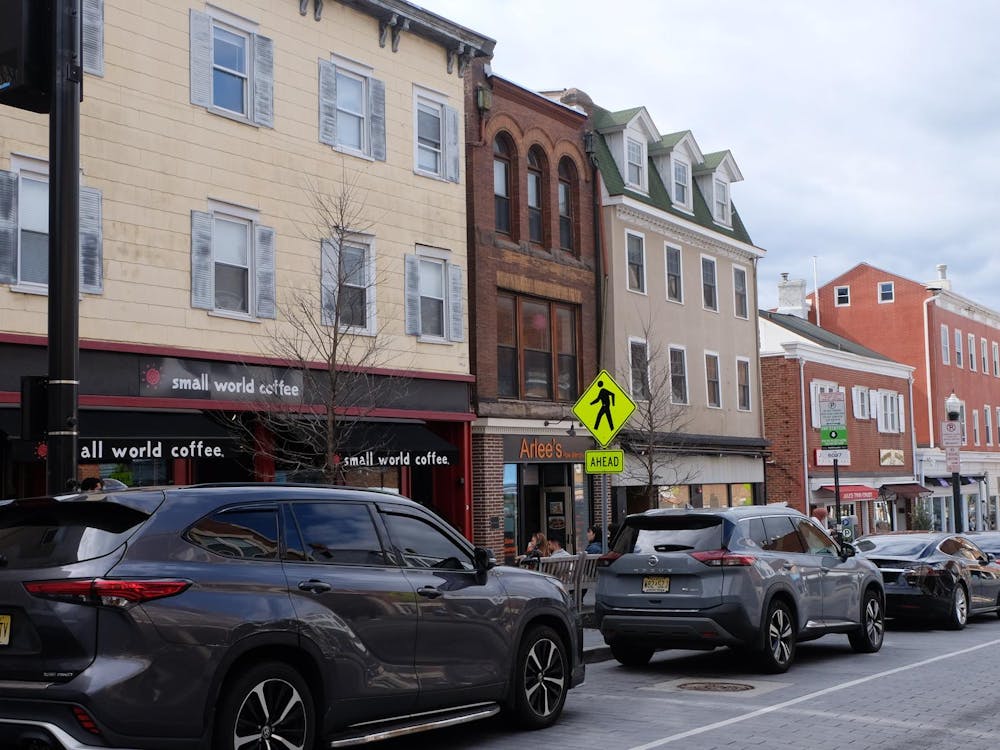Michael Pratt has been the Conductor of the Princeton University Orchestra (PUO) for 44 years and has served as the Director of the Certificate Program in Music Performance since its inception in 1991. He provided the original inspiration for and continues to direct Princeton’s partnership with the Royal College of Music, London. Throughout his career, he has conducted many esteemed ensembles — including the Boston Symphony Chamber Players and the Odessa (Ukraine) Philharmonic — and in 2018 he was awarded an honorary membership to the Royal College of Music, London by His Royal Highness The Prince of Wales.
After a year of rehearsing and performing with PUO, Assistant Prospect Editor Kerrie Liang sat down with Michael Pratt to have a conversation about music during the pandemic and the return to live performance. This interview has been edited slightly for clarity and concision.
Kerrie Liang: What did the early days of the pandemic look like for PUO?
Michael Pratt: We went online starting Spring 2020 and the whole next year was also online. For live music, the technical challenges were huge because of the delay. The video and the audio could never align. In music, it’s very noticeable, and it’s something you see in many YouTube videos of orchestras — for example, the sound of the new note comes a little bit before the bow changes. It’s not really a big issue when you’re just listening to music but when it’s two people trying to make music together, it becomes impossible.
KL: How did you work around these challenges?
MP: All we could do was make these layer-cake recordings. Do a click track and play your part one by one, and we saw orchestras all over the world doing this. Choruses of several hundred would record line by line, person by person, and they all had to listen to a click track or they had a conductor to look at — it was very complicated and very frustrating. For PUO, we just stuck along. We tried to make some ambitious recordings, and it took a long time.
KL: What were some projects you worked on during this time?
MP: In Fall 2020, we did a virtual opera. We had two choices: we could either do a virtual recording or just bag it altogether and say, “Alright, we’ll do this another time.” I opted to try and make a recording of La Calisto by Francesco Cavalli, and it was a tremendous effort from a lot of people. We got the harpsichord track laid down and then everybody had to record their stuff on top of it. Then the students were given staging directions — nobody was together, but they figured out ways to do dual scenes with split-screen and it really was an extraordinary technical achievement. We published an entire performance of this baroque opera. It was done in a modern setting, in 12 different locations internationally. The video and audio were done by cut-and-paste and splice. I hope I don't ever have to do it again, but it really was an achievement to do an opera like this.

KL: How does the lack of a physical presence affect the intimacy of a shared musical experience?
MP: It makes it very different and much less satisfying. Music is about communication — exchanging feelings and exchanging everything there is to exchange between human beings. There’s really hardly another experience that’s more intimate than making music with someone.
KL: Is it important to have somebody present and interpreting your music?
MP: Absolutely. If you don’t, it’s just sort of poured into a vacuum. For performers, the goal is to feel like they’re communicating with an audience. Sometimes, it doesn’t work out — it’s something you have to work for. When it happens, that’s like the highest of experiences, and for the audience not to be there, it’s just unbelievably awful. When we finally performed this year in the fall, and we had an audience in the room for Scheherazade, it was overwhelming. The audience was clearly so glad to be there and so glad to see us, and it was almost too intense to continue. It was an emotional experience unlike any other.

KL: It’s 7:30 p.m., and the concert is about to start. The auditorium is packed with people. What was that return like?
MP: There are no words for it. Excitement beyond imagination, and nervousness too. It’s like, “I haven’t done this for a while. How is it going to be? What is the audience’s expectation?” Once I walked out on stage and heard the ovation as the orchestra stood, it all went away. And there was nothing but wonder. Something that had been lost had been regained. I felt like the audience and orchestra were not two separate entities — they were one big organism. It was a wonderful act of sharing.
KL: And why Scheherezade? Obviously, it’s a major work, but what made you pick that piece specifically for your return?
MP: That’s easy. Firstly, everybody loves it and everybody knows what it is. It’s like offering everybody an ice cream cone or pizza. I know a number of students have played it but it’s so much fun, it’s so gratifying. Secondly, it satisfies both ends as an ensemble piece and as a piece with great solos. It’s just a wonderful “bring everybody together” kind of piece.
KL: How did it feel to be back, coming into the first rehearsal, seeing people in the same room making music together right in front of you?
MP: It felt like a part of me that had been missing was restored. There was a big hole in my life — I think that a lot of people had the same hole — and it reminded me not to take a lot of things for granted. The ability to do what we do — to make this extraordinarily moving and powerful music — should never have been taken for granted anyway, even before the pandemic. It has been demonstrated to us how much it was needed when it was taken away. We all felt bereft.
KL: How do you think isolation changed the way you approach your work?
MP: Oh it’s so much more important now — I mean, it’s always been important to me, but now it feels like there’s more at stake because I know what it was like not to have it. To what extent isolation has changed me… I guess you’d have to ask the Class of 2022. Do I feel like I’m different? Yes, I do. Regarding my feelings about the music, I just want to rip myself open and say “Here it is. This is how much I love it.”
KL: How do you think isolation might have felt for younger musicians, like those in PUO?
MP: On one hand, you still have a lot of years in front of you — you’ll be able to make up for this lost time. But on the other hand, this is a time in your life like no other. This is a time of exploratory growth and some of it has been taken away from you. I’m sure there’s a sense of loss. I remember when I was a student, I was crazy and wild and undisciplined and I was free to do that. Some of that freedom has been lost to your generation and I'm so sorry for that.
KL: You’ve talked about the Class of 2022 being one of the most compassionate groups of people. How have you seen them navigate this difficult time?
MP: One thing that increases compassion is going through a difficulty together, and the senior class has been through it the most. Half of their sophomore year, all of their junior year, and a lot of their senior year activities were taken from them. And yet, they responded by being generous. This is a huge senior class. This is 26 people — there’s usually a bit more attrition than that. Almost everybody in the Class of 2022 who joined as a freshman remained through the pandemic. And the intensity of their love for music was perhaps reawakened and strengthened by the difficult constraints of life, because the times when I feel like I have grown to understand music more are often times of difficulty that push me to hear a little bit deeper.
KL: Finally, in times of isolation, how does music empower people to be compassionate?
MP: Compassion is a “coming together” or a “joining” of two things, especially if the two things have faced some adversity, and that adversity is overcome by their joining — music is just so full of that. It is a constant joining of different lines, of different emotions — often conflicting emotions — all happening at the same time. One thing music does is it joins itself, it unfolds. In all the greatest music, we hear the human voice in it, reaching out to us with compassion and love. And we also feel that as musicians when we share [the experience] with each other. It reminds us that even though we’ve been through a lot and it’s not over yet, we’re still here.
Kerrie Liang is an Assistant Editor for The Prospect and Podcasts at the ‘Prince.’ She can be reached at kerrie.liang@princeton.edu, or on Instagram at @kerrie.liang.








